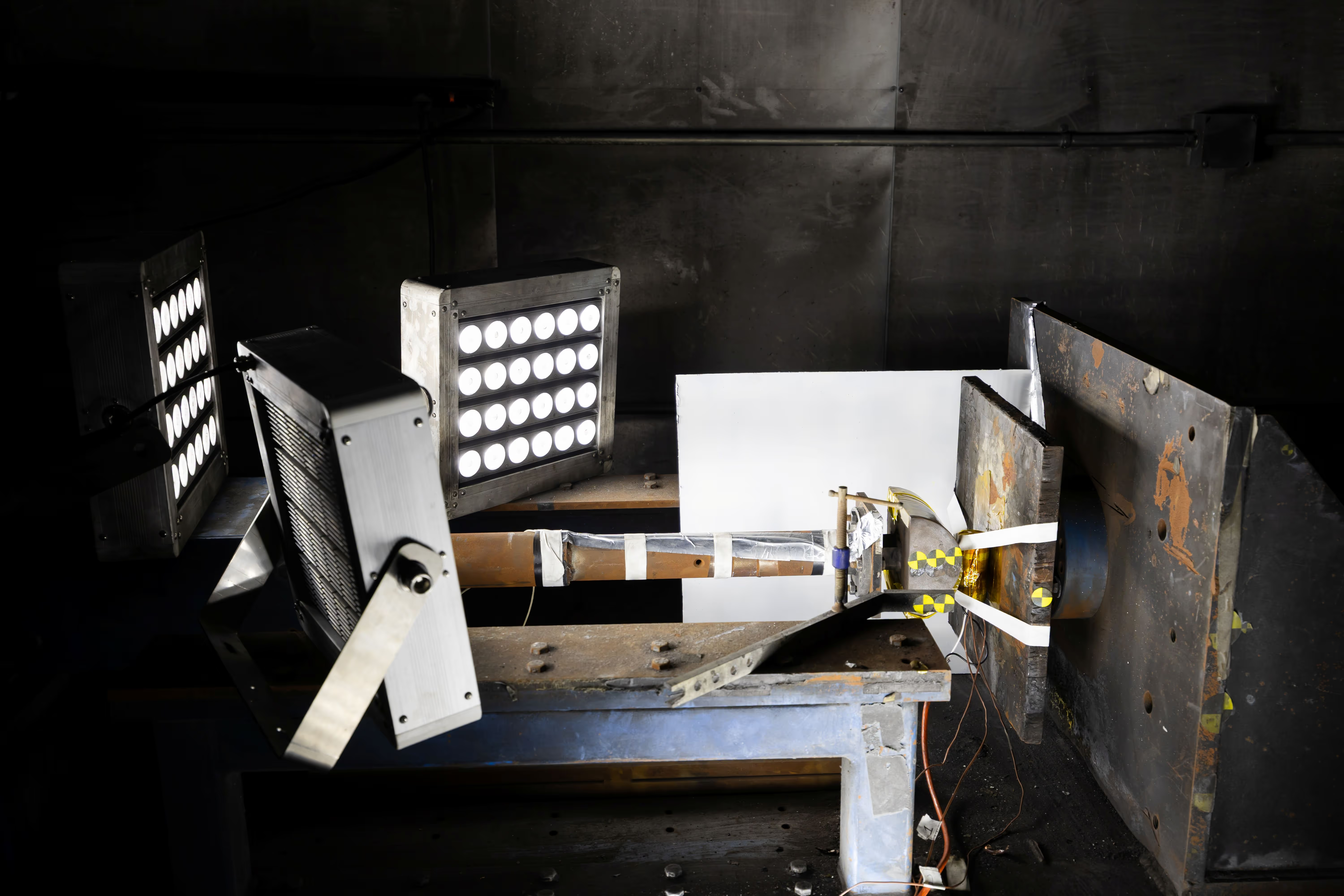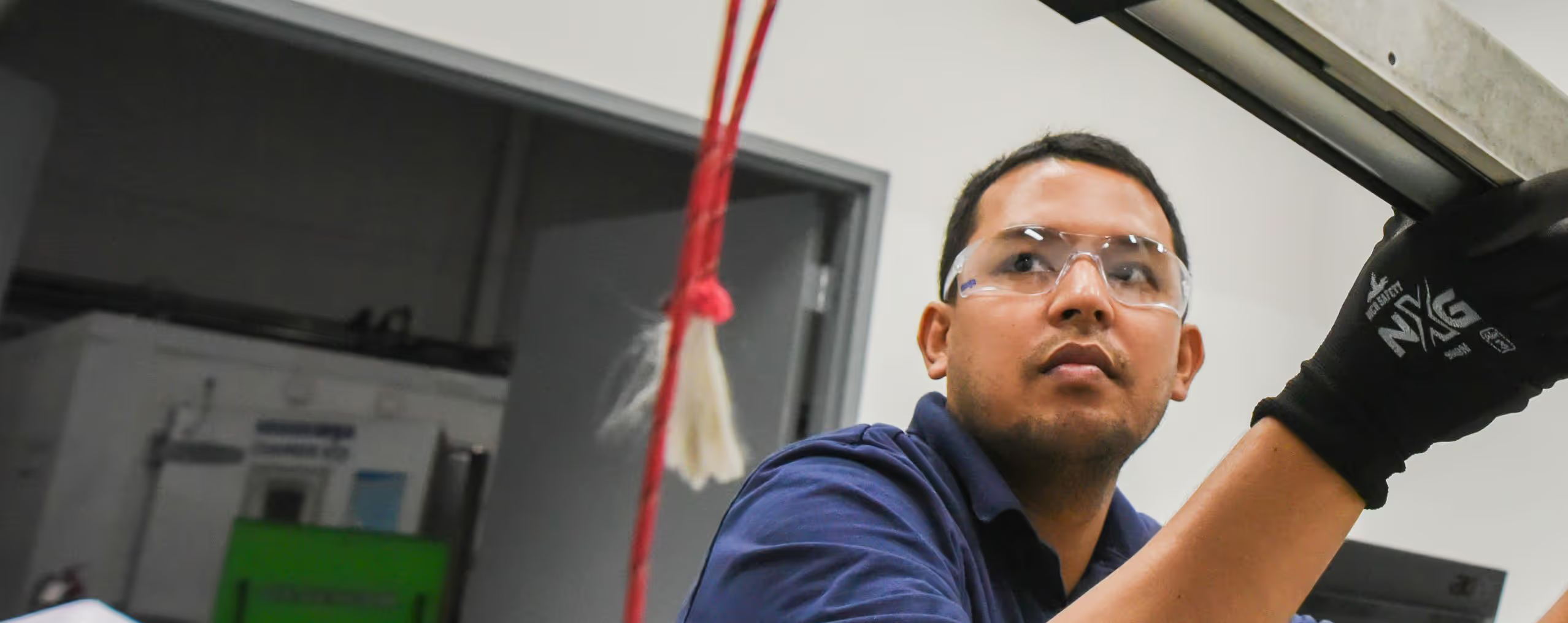
Battery Cell Testing
MGA Research offers comprehensive battery cell testing services across three dedicated facilities, leveraging decades of experience and advanced equipment to ensure the safety, performance, and regulatory compliance of battery cells for automotive, aerospace, and commercial energy storage applications.
Quick Overview

.avif)
UN 38.3 Expertise
We provide ISO 17025 accredited testing for UN 38.3, covering all required tests for safe battery transportation

Advanced Testing Capabilities
We conduct a wide range of tests including nail penetration, crush, overcharge, vibration, shock, and thermal simulations to ensure cell safety and performance.

Regulatory Support
MGA helps ensure battery cells meet various industry standards and regulatory requirements including SAE J2464, ISO 20653, and more.
At the core of almost every battery assembly, whether the application be automotive, aerospace, or other commercial energy storage, is the cell. A battery cell is the building block of a battery consisting of the anode, cathode, and an electrolyte that allows ions to flow between the two. Most lithium-based battery cells have a nominal voltage of around 3.6 or 3.7 volts, and when combined in series or parallel, create larger assemblies like battery “modules” or the complete battery itself.
MGA has been performing abuse and durability testing on battery cells at our Technical Services Lab (TSL) in Akron, New York for decades. In 2021, our battery lab in Holly, Michigan opened. Both facilities focus on battery safety topics such as nail penetration, overcharge, over discharge, vibration, shock, thermal and altitude simulation, load cycling, and insulation resistance: pushing cells up to and beyond their limits to ensure the safety of users, manufacturers, and transporters alike.
MGA Research is a leader in performance, safety, and environmental battery testing, recognized by our commitment to precision, innovation, and safety in evaluating battery performance across various industries. At the core of MGA’s capabilities, our three battery testing facilities are equipped with advanced equipment and operated by highly skilled engineers and technicians. These facilities are designed to conduct a wide range of tests that meet specific industry standards and regulatory requirements, each with their own specialty.
MGA Advantage
MGA utilizes a network of three battery test facilities, each with unique expertise, to provide the following advantages to our customer base:
- Dedicated test facilities for each stage of the battery: cell, module, and full pack/vehicle.
- Full battery cell evaluation services including nail penetration, crush, overcharge, over discharge, vibration, shock, thermal and altitude simulation, load cycling, and insulation resistance
- World class battery abuse testing facilities and equipment, much of which is MGA designed and manufactured.
- Unmatched battery abuse capabilities ranging from cell level nail penetration to full vehicle thermal propagation testing including key compliance test regulations including UN38.3, ECE R100, ECE R136, SAE J2464, SAE J2969, ISO 20653, DO-311, and more.
- Over 20 years of battery and electric vehicle experience, dating back to the earliest NHTSA EV testing.
UN38.3
UN38.3 battery testing refers to a series of rigorous safety tests required by the United Nations for lithium batteries to ensure they can be safely transported, particularly by air. The tests are outlined in the UN Manual of Tests and Criteria, Section 38.3, and are designed to simulate the conditions that batteries might encounter during shipping. MGA’s test facilities are ISO 17025 accredited for UN38.3 testing. These tests include:
- T1: Altitude Simulation - Exposes the battery to low pressure (simulating high altitude) to ensure it doesn't leak, vent, or rupture.
- T2: Thermal Test - Subjects the battery to rapid temperature cycling between extreme hot and cold to assess its stability under thermal stress.
- T3: Vibration Test - Simulates the vibrations a battery might experience during transportation to ensure it remains intact and functional.
- T4: Shock Test - Applies sudden mechanical shock to the battery to test its resilience against impacts.
- T5: External Short Circuit - Simulates an external short circuit to verify the battery’s ability to withstand it without causing fire or explosion.
- T6: Impact/Crush - For small batteries, an impact test simulates a crush scenario to ensure safety under mechanical stress.
- T7: Overcharge - Overcharges the battery to see if it can handle excessive charging without failure.
- T8: Forced Discharge/Over discharge - Forces a discharge on the battery to check its safety under this abnormal condition.
Nail Penetration
Nail Penetration is a destructive test used to determine the physical reaction of a cell or battery to extreme physical damage possible in the real-world. This test is particularly important for lithium-ion batteries, which can be sensitive to internal short circuits and other failures, such as thermal runaway, caused by mechanical damage. A sharp, metallic nail (usually made of stainless steel) is driven through the center of the battery cell at a controlled speed. This causes an internal short circuit in addition to physical damage.
The temperature, gas emissions, and physical response of the battery are monitored during and after the penetration. The cell is observed for any signs of fire, smoke, gas venting, thermal runaway (uncontrolled), or explosion.
Crush Testing
Crush testing is similar to nail penetration in that we are intentionally damaging a cell or battery by using a large hydraulic system to crush the battery in order to observe and record the reaction. Such damage could occur in a vehicle accident or other real-world scenario. By undergoing crush testing, manufacturers ensure that their batteries will behave safely under extreme mechanical stress, reducing the likelihood of dangerous failures and injuries in real-world scenarios.

Ready to Get Started?
Let's discuss your testing needs and how MGA can help. Our team is ready to provide the expertise and solutions you're looking for.
